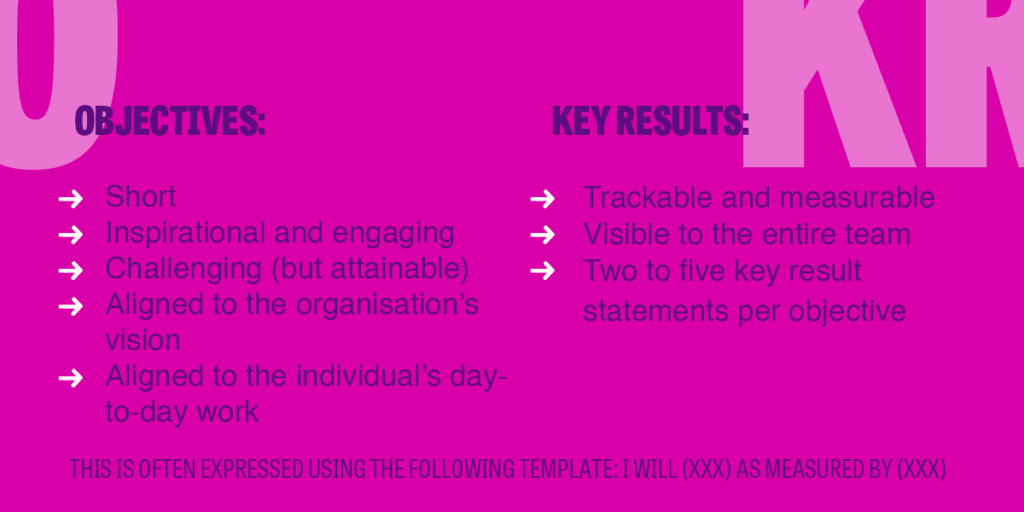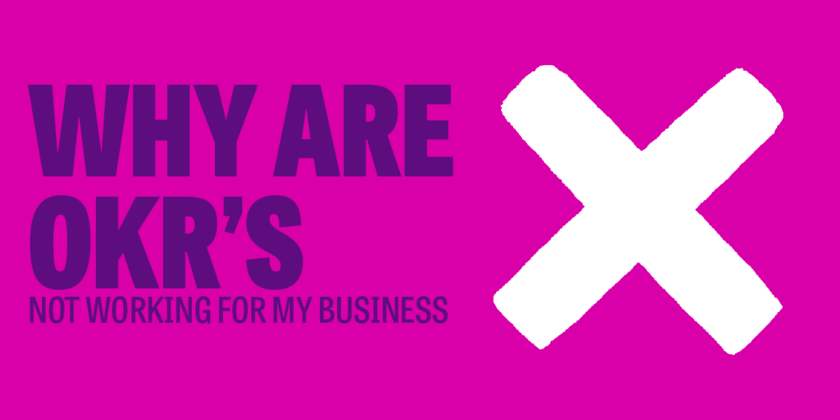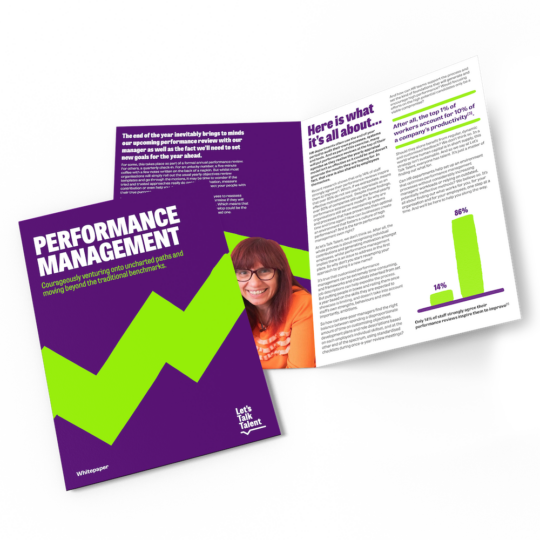Are OKRs the right performance management framework to use for your organisation?
If you are looking for ways to generate high performance within your organisation or to boost your performance management process, you’ve probably heard of OKRs (Objectives and Key Results). After all, the popular goal-setting framework was implemented by Google in 1999, a business known for its innovative (and highly effective) talent management practices. What could go wrong? Actually, many clients have come to us after giving OKRs a go, wondering why the famous performance management model isn’t working for them.
At Let’s Talk Talent (LTT), we agree that performance management as a whole needs a bit of a revamp. In fact, we prefer to think of it as performance development. We believe that motivation and contribution are key levers to utilise and as such, we understand that OKRs may be an attractive option. But is this new model right for everyone? Should businesses steer clear of the framework and stick to tried-and-tested models such as annual appraisals and pay-and-reward systems?
“OKRs can work,” states Jo Taylor, MD at LTT. “But they work in a certain context. There are a few things you should know before going all in with OKRs.”
What are OKRs?
OKRs are a goal-oriented method focused on setting stretching objectives and measuring progress. They ensure that selected goals are in close alignment with both the organisation’s vision, and the individual’s daily tasks. Sounds like regular KPIs? Not quite.
OKRs are designed to generate high performance. They involve setting challenging goals, which are believed to enhance employee engagement. OKRs are about meeting key objectives, just like old-fashioned performance management metrics, but they are also about pace, and accelerating the performance process. While ambitious objectives may feel uncomfortable for staff, they also foster engagement, motivation and a sense of empowerment and accountability.
The components of OKRs
There are two components of OKRs. Not surprisingly, objectives and key results (at LTT, we do like when things are simple!).

We all know that Google is a pioneer in the area of organisational performance, as demonstrated by its work on psychological safety and the essential traits of modern managers. So if OKRs are working for the tech giant, shouldn’t we all follow suit?
What’s good about OKRs
Increased employee engagement
When compared to traditional performance management systems, the OKR framework does tend to generate higher levels of employee engagement. Organisations that have successfully aligned their organisational goals to their performance management process are indeed likely to see a higher level of commitment towards reaching these goals. OKRs are also great when it comes to highlighting someone’s contribution, which in turn has a positive effect on employee retention.
Increased performance
The system makes it very clear what individuals are responsible for, and how they can go about contributing to the organisation. This tends to lead to increased focus, and stops people from working in silos. OKRs ensure everyone is working towards clear organisational and team goals, which does foster a culture of high performance.
Better feedback for employee
In order to work, the process does need to be supported by clear and transparent feedback throughout the employee’s journey. Organisations that have taken the plunge and put this in place are keeping track of objectives via weekly team meetings, regular one-to-ones and quarterly performance reviews. This structure provides their team members with what they need to keep moving in the right direction, or course correct as soon as it becomes needed.
What needs to be in place before implementing OKRs
A culture of continuous feedback
As mentioned, a culture of continuous feedback is essential for OKRs to work. Objectives set are challenging, and just leaving employees to it basically means setting them up to fail. Feedback sessions, reviews and stand-ups cannot just be left on an ‘as and when needed’ basis: they need to be baked in and adhered to. Otherwise, the challenging objectives required by the framework can become a stick with which to beat employees.
A strong management community
This is needed to set up the framework, as well as deliver the right feedback. You may want to invest in some training to upskill your managerial team, or to boost their confidence. “It’s not just about making sure they understand and can apply the process,” says Jo. “It’s about people understanding how to set a stretching goal, and how to support their team members.”
Time to manage the process
And it goes without saying that managing it does require a fair amount of time. Everyone involved, from leaders to individuals, needs to be given the time and space to get to grips with this new system.
A clear organisational vision
While it’s been mentioned that OKRs should be closely aligned to the organisation’s mission and vision, what happens when this is fuzzy? What if most people aren’t clear on the business goals they are contributing to? “If there is no clarity over where your organisation is going, OKRs will not work well,” states Jo. “This framework is based on a foundation of collaboration, empowerment and transparency. Any organisation overly reliant on processes and hierarchy will struggle with the OKRs model.”
Is this to say that OKRs are best left to the young, agile startups? Not necessarily. Some great insights can be gathered from the methodology. Regular feedback instead of yearly appraisals, setting challenging goals and ensuring employees have the support to reach them, and aligning objectives to the company’s long-term strategy are all key components of a successful process.
At Let’s Talk Talent, we believe that performance development is about finding the right balance between people, managers and processes. And each organisation should focus on finding the perfect mix for their unique context.
For some tips on how to balance people, managers and processes, have a look at our performance management whitepaper.
Revamping your performance management process
OKRs can present great benefits when it comes to revamping the old-fashioned yearly appraisal performance management process. But in order for them to work, certain factors need to be in place. This framework may work for some organisations, and not for others. However, the foundations of performance management remain the same: it’s about developing an individual, and recognising their contribution to the organisation. As such, creating the kind of feedback culture that will allow your people to stretch themselves, and empower them to reach for the next challenge should be a key focus, whether OKRs are your framework of choice or not.
Thinking of giving OKRs a go, or wondering if they are right for you? Book a call with us to find out. Or download our free performance management whitepaper on the performance management service page of our website. We’ve also got a great podcast episode on how to have better performance conversations. Don’t miss it!
Related Talent Management resources:
- Ultimate List of HR Metrics [Blog + Download]
- What Is Succession Planning? & How You Can Get Started [Blog]
- Why succession planning is vital to retain your technical specialists [Blog]
- How Predictive Succession Planning Can Ensure You Reach Your Long-term Objectives [Blog]
- Future-proof your business through diversity [Blog]

